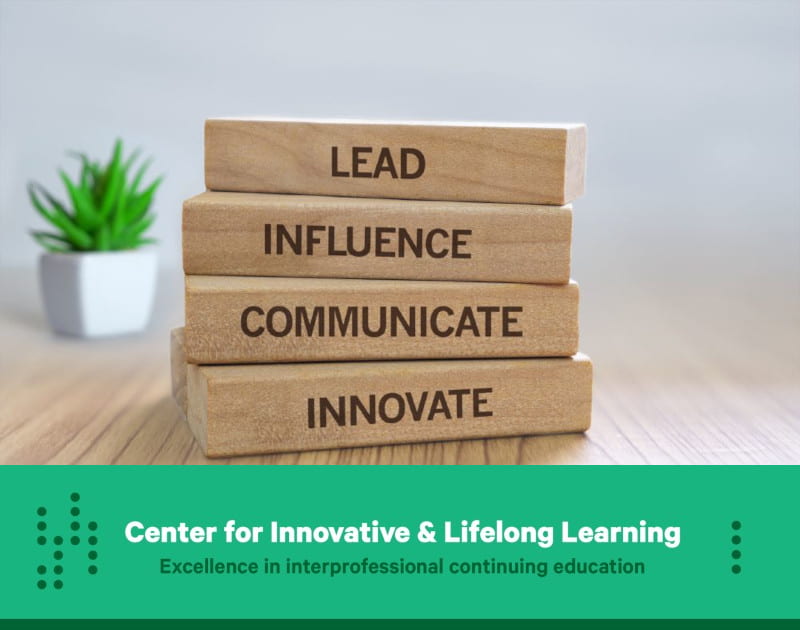
Become a Better Leader. Gain a Competitive Edge.
Many leaders find that the skills and abilities that promote them into a leadership role don’t automatically lead to further success or professional advancement. Interprofessional Leadership™ provides practical, state-of-the-art, research-based skills to empower leaders to increase their effectiveness, drive results, and build high impact teams, especially in times of change. Participants will connect with colleagues and build strategic alliances within and across functional areas.
This course has been approved for AMA PRA Category 1 CreditTM, Continuing Nursing credits, and continuing education for social work through the State of Illinois.
"This was an excellent program, one which I shared with many colleagues as something to explore. Before starting, I was hesitant if the program was meant for me in an allied health role. I am a leader in my work but am not a physician or department lead. The course was inclusive of everyone and anyone. It was well facilitated and reflected/modeled the skills of leadership being taught. There was no focus on a specific type of leader, or indication one was more important than another—in fact, there was noted emphasis on cross-role leadership. I met and learned from some exceptional and collaborative colleagues at Rush I may never have known otherwise."
- Anna Saulitis, AM, LCSW

Associate Dean of Medical Student Affairs, Rush Medical College
Associate Professor, Division of Behavioral Sciences, Rush Medical College
Director, Section of Geriatric and Rehabilitation Psychology

Director, Center for Innovative & Lifelong Learning
Tuition
$589
Rush employees may use Educational Enhancement Funds (formerly LEAP Funds) to pay for the program.
Intended Audience
Interprofessional healthcare leaders, motivated to take their leadership to the next level.
Excellent course with very knowledgeable instructors. The pre-work is thorough but not overwhelming. Small group sessions and breakout groups were very valuable and I always learned a lot from the other person or group that I was assigned to. Would recommend this excellent course to anyone who wants to improve their leadership/communication skills.
- Laura Deon, MD
Excellent content, interactive and engaging, practice/mock sessions were beneficial, personalities of hosts added to the enjoyment of the curriculum, I learned new skills based on the real world examples, and the insights of providers in other specialties enhanced my learning experience.
- Jonathan Kaplan, MD
Live Webinar Schedule & Topics
Each module includes 30 minutes of online pre-work to be completed prior to the webinar session.
Module 1: Understanding Self and Others with DiSC
August 4
7-9 a.m. Central
DiSC theory and practice provide a means to more fully understand motivation and behavior – our own and others. Our increased awareness regarding how DISC styles impact everyday actions, serves to enhance our ability to strategically adapt to different environments, flex our communication style, and optimally respond to or avoid conflict. Through increasing our understanding of our own and others’ DiSC styles, we can elevate our relationships, productivity, and outcomes.
Learning Outcomes:
- Summarize your DiSC style and distinguish it from other DiSC styles
- Differentiate the strengths and weaknesses of all DiSC styles
- Employ people reading strategies to optimize communication outcomes
Module 2: Influential Communication
August 18
7:30-9 a.m. Central
Leaders are often required to influence others outside of their formal authority to accept a point of view, adopt a specific agenda, or engage in a course of action that is in the best interest of the organization. The essence of influencing is about changing the hearts, minds, and behavior of others to generate value-added outcomes. Influential communication is a respectful and humble enterprise that requires understanding others’ values, perspectives, motivators, behaviors, and influencing orientation language. Skilled communicators are proficient in “style flexing” as a means to influence diverse audiences and situations.
Learning Objectives:
- Summarize influential communication elements
- Describe the four influencing orientations
- Employ “style flexing” strategies to optimize communication outcomes
Module 3: Leadership Coaching Essentials – GROW Model
September 8
7:30-9 a.m. Central
Leadership is all about the ability to get things done well through others. Effective leaders are skilled at optimally developing their direct reports and teams through coaching. Coaching is a process that results in improved performance and organizational outcomes, while simultaneously increasing motivation, engagement and commitment. The GROW Model provides a framework for coaching conversations that proactively align behavior with outcome goals. It’s easy to understand and provides a means to develop excellence in others.
Learning Objectives:
- Summarize leadership coaching essentials
- Identify GROW Model coaching elements
- Utilize the GROW Model in a coaching situation
Module 4: High Impact Feedback – SBI Model
September 22
7-9 a.m. Central
Leaders often feel uncomfortable when delivering feedback regarding unsatisfactory work performance. This discomfort leads to either avoiding these conversations or having an unproductive discussion. The SBI Model (situation, behavior, impact) is a simple and powerful tool for facilitating respectful feedback conversations. Utilizing the SBI Model increases the likelihood of recipients being motivated to improve their performance.
Learning Outcomes:
- Identify personal challenges in delivering feedback
- Distinguish key elements of the SBI Model
- Practice providing feedback utilizing the SBI Model
Module 5: Restorative Justice and Conflict Resolution
October 6
7:30-9 a.m. Central
Restorative Justice is a philosophy, an approach, and a practice to hold offenders accountable for the impact of the harm their actions have inflicted on others. Conflict Resolution facilitates a peaceful solution to a struggle, dispute, or disagreement between two or more parties. At their core, Conflict Resolution and Restorative Justice focus on restoring and repairing relationship violations between individuals, within organizations, and within and across teams. Restorative Justice fundamental principles can be utilized in professional settings to circumvent potential conflict situations, resolve current conflicts, and restore integrity to relationships.
Learning Outcomes:
- Identify Restorative Justice and Conflict Resolution fundamental principles
- Employ Restorative Justice-based questions to explore and resolve conflict
- Apply Restorative Justice fundamentals to characteristic leadership challenges
Module 6: Building High Performance Teams
October 20
7:30-9 a.m. Central
High performance teams are highly focused on their goals and outperform similar teams. They innovate faster, see mistakes quicker and more clearly, find better solutions to problems, and consistently achieve better results. High performance team members are committed to the team’s overall goals and are willing to go the extra mile for each other. Out of the five key factors research has identified in high performance teams, psychological safety is the most critical one.
Learning Objectives:
- Summarize essential factors for building high performance teams
- Assess your team utilizing the five factors of high performance teams
- Develop strategies for fostering psychological safely
Module 7: Negotiating Essentials
November 3
7:30-9 a.m. Central
The capacity to negotiate for and secure essential resources is a critical leadership skill that can increase a leader’s influence, ability to navigate their organization’s political landscape, and ability to achieve optimal results. Understanding and employing essential negotiating strategies and mindsets can make the difference between insufficient, adequate, or excellent results.
Learning Objectives:
- Distinguish key mindsets for successful negotiations
- Identify core negotiating principles and strategies
- Evaluate a personal negotiation
Module 8: Leadership in Times of Change
November 17
7:30-9 a.m. Central
The only constant is change. In order to be successful, today’s leaders need to work with the challenges, opportunities, and inherent aspects in a VUCA environment - volatility, uncertainty, complexity and ambiguity. Strategies that assist leaders in navigating through the inherent challenges of change include VUCA Prime model fundamentals and key elements from Greg McKeon’s Essentialism model.
Learning Outcomes:
- Identify significant leadership challenges in times of change
- Describe essential skills for leading through change
- Apply VUCA Prime principles to mitigate challenges of change
In support of improving patient care, Rush University Medical Center is jointly accredited by the Accreditation Council for Continuing Medical Education (ACCME), the Accreditation Council for Pharmacy Education (ACPE), and the American Nurses Credentialing Center (ANCC), to provide continuing education for the healthcare team.
Rush University Medical Center designates this live activity for a maximum of SEVENTEEN (17) AMA PRA Category 1 Credit(s)TM. Physicians should claim only credit commensurate with the extent of their participation in the activity.
Rush University Medical Center designates this live activity for a maximum of SEVENTEEN (17) nursing contact hour(s).
This activity is being presented without bias and without commercial support.
Rush University is an approved provider for physical therapy (216.000272), occupational therapy, respiratory therapy, social work (159.001203), nutrition, and speech-audiology by the Illinois Department of Professional Regulation.
Rush University designates this live activity for (17) Continuing Education credit(s).
